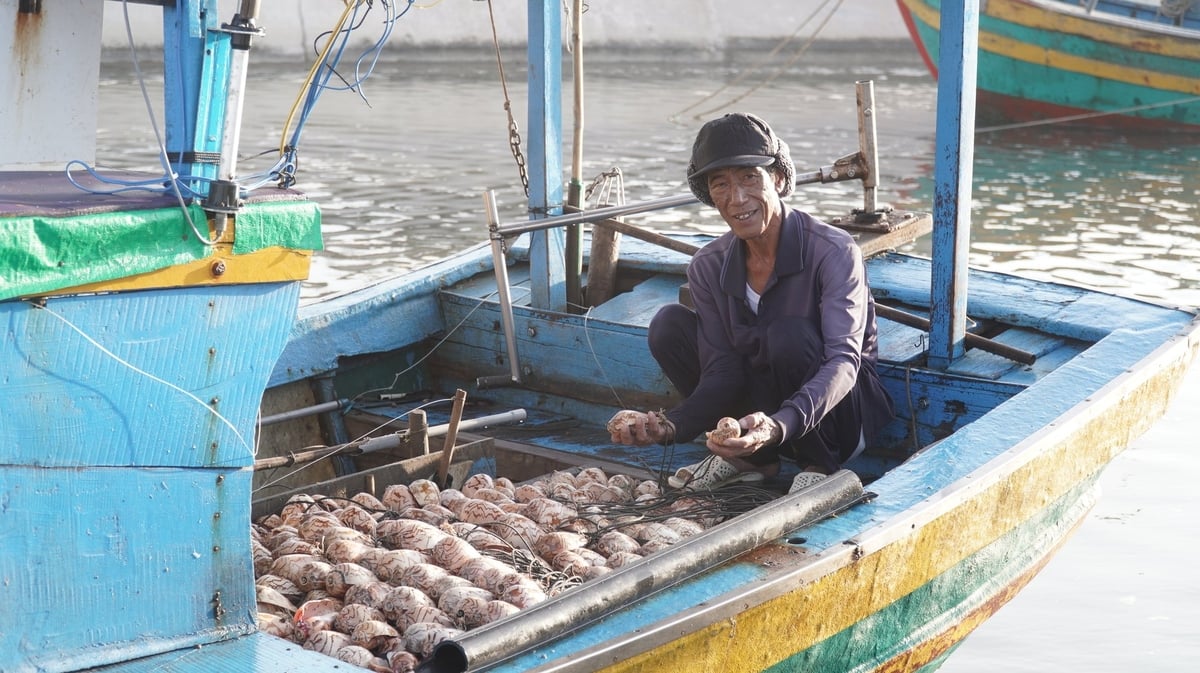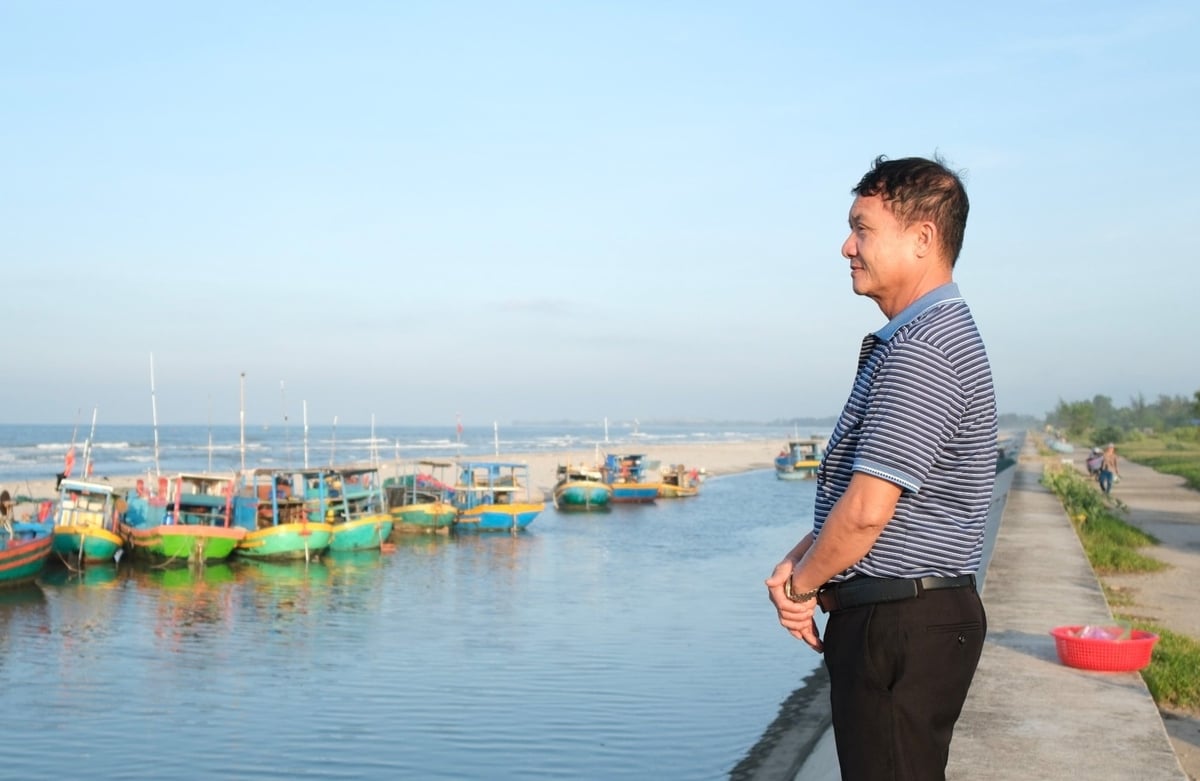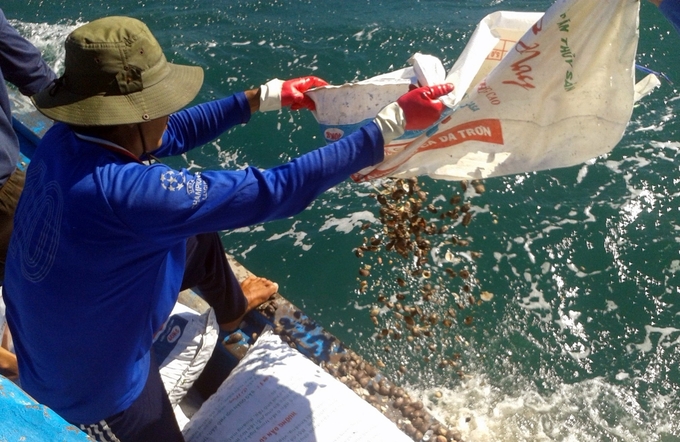November 24, 2025 | 07:26 GMT +7
November 24, 2025 | 07:26 GMT +7
Hotline: 0913.378.918
November 24, 2025 | 07:26 GMT +7
Hotline: 0913.378.918
Along the coast of Tan Thuan - Ham Thuan Nam (Lam Dong province), people see Mr. Vo Viet Tuan diligently pushing his basket boat into the water every day, beginning his familiar journey out to sea. Without a motor or fuel, just an oar and a basket boat faded with years, he quietly makes a living amidst the vast ocean.
Having clung to the sea for over 45 years, Mr. Tuan has witnessed countless changes. "Before, there were so many fish; just casting the net would bring them in. Now, the water is sparse, fish are few, and after a whole morning, I only get a few kilograms, sometimes full, sometimes hungry," he recounts.
Even so, he doesn't give up. Each trip is a struggle with the waves, a sweat, and a belief in the profession passed down by his ancestors.

Fisherman Vo Viet Tuan, a member of the Tan Thuan Community Fisheries Association, returns after a night at sea. Photo: Tran Phi.
Since the establishment of the Bien Vang (Golden Sea) Fishermen’s House – the meeting place of the Tan Thuan Community Fisheries Association – Mr. Tuan's life has become somewhat less arduous.
"We receive training, learn how to fish in the right zones and at the right times, and we remind each other to protect our shared marine resources. Thanks to that, our income has improved a bit,” he shares.
He especially values the association’s gatherings, where fishermen not only exchange experience but also remind one another to care for the sea and avoid destructive practices.
This same spirit is what enabled the Tan Thuan fishermen to become one of the first communities in the country to be officially recognized and granted management rights over marine resource protection under the 2017 Fisheries Law.
Still, illegal trawling continues under the cover of night. “They come in with a roar, sweeping right along the shore, scooping up everything: big fish, small fish, all gone. I row my little basket boat alone and it breaks my heart,” Mr. Tuan says, shaking his head. Small boats like his, already at a disadvantage, now face even greater hardship in the daily struggle to survive.
Yet the seasoned fisherman stays true to his values: “I don’t use electric shocks, and I don’t fish carelessly. Life at sea depends on nature: if we rely on it, we must also protect it. Tough times don’t justify reckless fishing.”
According to Mr. Dau Trong Trung, Chairman of the Tan Thuan Community Fisheries Association, the group operates based on the principle of “co-management” - a model in which the State shares authority and responsibility with local communities in protecting and sustainably managing marine resources.
In response to rampant overfishing and declining fish stocks, the association was officially established on June 22, 2018, following advocacy efforts by the Sub-Department of Fisheries, the Provincial Fisheries Association, and local authorities. The formation came after 12 rounds of community consultations.
At its inception, the association had just 42 members; by 2023, that number had grown to 178. The state granted the association management rights over 17.7 km² of coastal waters. The association has deployed 14 artificial reef clusters worth 260 million VND (equivalent to 10,200 USD) and installed 12 buoys to demarcate the co-managed marine area.
Notably, a 52-member monitoring team from Tan Thuan has become a vital partner to local authorities, working alongside fisheries inspectors and border guards to enforce regulations against IUU (illegal, unreported, and unregulated) fishing.
Over the years, the monitoring group has provided 126 valuable reports to relevant agencies, contributing to the prevention and penalization of 65 violations.

Mr. Dau Trong Trung, Chairman of the Tan Thuan Community Fisheries Association, observing fishing activities in the morning. Photo: Quynh Chi.
According to the United Nations Development Programme (UNDP), the root cause of IUU (illegal, unreported, and unregulated) fishing in Vietnam is the excessive exploitation of marine resources, resulting in low harvesting efficiency.
In 2021, Vietnam’s total seafood catch reached 3.92 million tons - significantly higher than the recommended sustainable limit of 2.75 million tons. As fishing pressure increases, marine resources are rapidly depleting, reducing economic returns. Struggling to make ends meet, many fishermen feel compelled to resort to IUU practices just to cover costs.
In the waters of the former Binh Thuan province alone, in 2021, as many as 7,545 fishing boats over 6 meters long operated in the nearshore and coastal zone spanning more than 14,000 km². Thousands of boats from other provinces also enter the area to fish each year.
Meanwhile, enforcement capacity at sea remained limited. At the time, the provincial fisheries surveillance force was unable to oversee such a vast maritime area effectively. Law enforcement efforts thus fell short, especially in the absence of cooperation and support from the fishing communities themselves.
In response to these challenges, since 2017, the Small Grants Programme (SGP) of the Global Environment Facility (GEF), implemented by UNDP, has worked alongside the Tan Thuan fishing community to promote more sustainable fisheries management. One of the project’s key initiatives was the establishment of a community-led “Monitoring Team” to combat IUU fishing.
“No one understands the sea better than the fishermen themselves. They are the ones who can quickly detect and report violations occurring in the very waters they depend on,” explained Ms. Nguyen Thi Thu Huyen, National Coordinator of the GEF SGP (UNDP/GEF/SGP).
She emphasized that co-management is a practical approach that significantly contributes to reducing IUU fishing and fostering sustainable livelihoods. With the proper awareness and encouragement, communities come to understand that protecting marine resources is ultimately about safeguarding their own long-term livelihoods - and those of future generations.

The waters of the former Binh Thuan province are home to a variety of distinctive bivalve mollusk species with high economic value. Photo: KS.
With support from international organizations, local authorities, and the Community Fisheries Association, the “IUU monitoring team” model was established. It consists of one team leader, three deputy leaders responsible for different areas, and 48 experienced fishermen.
Each month, the team holds regular meetings to discuss current issues with representatives from the local government, fisheries surveillance, and border guards. The team also receives equipment such as cameras, video recorders, binoculars, and logbooks to facilitate their monitoring work. Through a designated hotline, members can promptly report violations to the relevant authorities, ensuring swift and effective enforcement.
“Based on our monitoring, we’ve seen a steady increase in catch volume within the association’s waters - an estimated annual growth of about 10–15%,” said Mr. Le, head of the IUU Monitoring Team.
Thanks to these efforts, the community-based organization has gained growing credibility, and today, 100% of local fishermen have signed a commitment not to engage in IUU fishing. The core group of fishermen has also played a key role in advocacy, helping Lam Dong become one of the first provinces in the country to complete the installation of Vessel Monitoring Systems (VMS) on all fishing boats 15 meters or longer.
When asked how they respond to unauthorized vessels entering community-managed waters, the fishermen explained: “We use radios to issue warnings and ask them to leave. If they return, we record videos, take photos, note the vessel’s registration number, and report the incident to border guards or fisheries enforcement for action.”
In some cases, both sides can negotiate to minimize losses, but there are also situations where legal enforcement is necessary.
“After decades at sea, I’ve learned one thing: only by standing together and protecting our waters can we hope for a sustainable future,” said Mr. Le Thanh, deputy head of the IUU Monitoring Team.
What the community hopes for most now is that authorities take stronger action to end destructive bottom trawling, which is the main culprit behind the degradation of the marine ecosystem.
The pressure of overfishing has led to a severe decline in coastal fishery resources and biodiversity. In pursuit of livelihoods, some fishermen have even risked venturing into foreign waters for illegal fishing - activities that pose serious safety risks and legal consequences.
Translated by Phuong Linh
/2025/11/22/4018-4-213342_747.jpg)
(VAN) The Mekong Delta Agricultural Experts Club has attracted 143 experts and researchers to participate in providing consultancy and contributing initiatives to the development of one million hectares of high-quality rice.

(VAN) Ca Mau’s development of OCOP products opens a path to increasing cooperatives value, helping boost income, expand markets, and affirm collective economy's role.

(VAN) Turning seemingly ordinary coconut shells into unique jewelry and artwork, Nguyen Bang Nhi spreads the value of local culture through her brand, Cocohand.

(VAN) Results from the Sustainable Durian Model Project in Dak Lak have confirmed the critical role of Yara Viet Nam in transferring advanced nutritional solutions to farmers.

(VAN) In Tuyen Quang province, livestock farmers have introduced effective models and innovative practices that significantly strengthen African Swine Fever prevention and control efforts.

(VAN) This is the study conducted by IRRI and Can Tho University on the rice straw value chain in Mekong Delta showing an economic potential of more than 6.6 trillion VND/year.

(VAN) By participating in cooperative economics, many farmers in Tay Ninh have overcome hardship, mastered clean dragon fruit cultivation techniques.